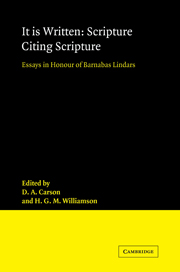2 - History
Published online by Cambridge University Press: 16 January 2010
Summary
There are two principal ways in which the historical books of the Old Testament make use of earlier scriptural material. One is the interpretation and application of the law of Moses, attested especially in the books of Ezra and Nehemiah, but not lacking from Chronicles or even the Deuteronomic History. The other is the Chronicler's use of Samuel and Kings. In these two areas is to be found a major stimulus towards both the halakhic and the haggadic readings of Scripture which became so pervasive in later centuries, and we shall therefore concentrate on these in the present chapter. Of the many other topics which clamour for attention, none is of greater theological interest than the use of prophetic sayings in late Old Testament historical writing, so that a third brief section has been devoted to them. Needless to say, for reasons of space it has been necessary severely to limit the number of examples adduced in each case.
THE LAW
The books of Ezra and Nehemiah refer to the book of the law under an astonishing variety of titles: the law of Moses (Ezra 3:2; 7:6; cf. 2 Chron. 23:18; 30:10); the book of Moses (Ezra 6:18; Neh. 13:1; cf. 2 Chron. 35:12); the law of the Lord (Ezra 7:10, and popular also in Chronicles; cf. 1 Chron. 16:40; 2 Chron. 31:3, 4; 35:26); the law of your God (Ezra 7:14, 26); the book of the law of Moses (Neh. 8:1); the book of the law (Neh. 8:3; cf. 2 Chron. 34:15).
- Type
- Chapter
- Information
- It Is Written: Scripture Citing ScriptureEssays in Honour of Barnabas Lindars, SSF, pp. 25 - 38Publisher: Cambridge University PressPrint publication year: 1988
- 1
- Cited by



